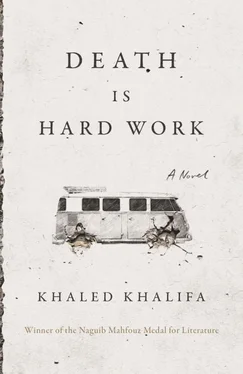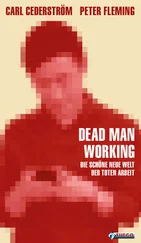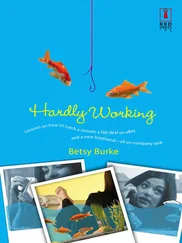Hussein’s cruel words shocked them with facts they had been doing their best to avoid. They had been living in this small town for many years, but they were still outsiders. Despite their perpetual belief that they weren’t poor, in truth they were not at all well off, as most families working in the public sector weren’t. Everything around them, everything their father had built, Hussein turned to rubble in seconds. Their father hadn’t had the courage to live in Damascus, for fear of getting lost; he liked gatherings where everyone was somehow linked by familial or party ties. He couldn’t bear the thought of being a stranger in a large city, but in the end he’d still become the stranger he had never wanted to be. At first, whenever Abdel Latif was mentioned by a native of S, they reiterated his connection to Anabiya: it wasn’t easy to escape that identity, but even this would pass in time. Returning to Anabiya was no longer feasible. It seemed very far away; as if all his friends had died or had forgotten their childhood, or indeed anything that linked them with Abdel Latif as members of the same generation.
After Hussein left the house, their father was silent for three days. He didn’t leave his room and ate only a few morsels. His wife was indifferent to the behavior of both. Bolbol soon thought it might be a good idea for him to get away for a while himself; Abdel Latif wouldn’t be able to get past what had happened as long as he knew Bolbol, his other son, who had witnessed everything, was around. Bolbol asked permission to travel to Anabiya, as he did every year, to spend a few days with his kindhearted aunt Amina—a good way to keep himself from being underfoot. He told his mother, “I’ll be back in a week, and everything will be fine again.”
His grandfather’s house in Anabiya was long gone. There was only a collection of relatives left there, most of whom had forgotten some time ago that Bolbol’s family ever existed, particularly after Abdel Latif refused to participate in their various and venerable family feuds, which he considered a backward practice for the latter half of the twentieth century. Only Aunt Amina had continued to care. On Bolbol’s visits she would tell him their family history, and he would try to piece together the story of his father’s flight from his village and his family. The story his aunt always told had parts missing, and she stopped at the first mention of the three knights, as they were known in the village: Abdel Latif and his cousins, Jamil and Abdel Karim. They were the first young men in the village to get their high-school diplomas, tramping the muddy winter lanes half barefoot to reach the school in Afrin, which in the early sixties was still a small, clean town. It required the strength of a mule to make that journey every morning and to return every night. Beneath the pouring rain, the three would cross the fields on foot, sometimes sleeping at a friend’s house or in a mosque when floods closed the road. They couldn’t afford to rent a small room in town, and their determination to finish school forced their families to save small amounts to cover their fees.
Abdel Latif would boast of how they lived: the whole winter they would cook lentil soup and bulgur wheat and walk barefoot to school; they would distribute Baath Party leaflets and get thrown in jail; they would face the whip and still hold out. Knowledge was a battle and politics a sacrifice, as well as a contest, he would conclude to his audience, who had heard the tale hundreds of times. No one in Anabiya remembered those battles now, but they certainly didn’t forget Bolbol’s uncle, Lieutenant Colonel Jamil, who, if he’d had better luck, might have wound up president of the republic. As it was he had been betrayed by certain friends who’d slandered him and his associates. As the price for their defamatory comments, those men had accepted an amount of influence that still wasn’t exhausted forty years later. Everything was upside down, now: the whole family was branded as traitors, and the slanderers were considered heroes.
The corpse of Abdel Latif, now laid out on a minibus seat, gave no indication of the man’s past strength of conviction—that Palestine would one day be fully liberated, for example, and that he would one day pray with his friends in al-Aqsa Mosque. Forty years earlier Abdel Latif had picked up his tin suitcase and left his village for good, after he had failed to support his sister Layla in her refusal to marry a man she didn’t love. Not even when she said, “I’ll set myself on fire before I marry a man who stinks of rotten onions.” And, sure enough, on the day of the wedding she had been forced into, she stood on the roof of her family’s tall house in her white dress, poured out a jug of kerosene, and set herself alight, carrying out the threat no one had taken seriously. She whirled around like a Sufi to best let the flames take her body, which had become a charred corpse before anyone could reach her. Abdel Latif had watched her from a distance, weeping for her silently, as his three children were doing now for him: despite how bad life had become, death could still seem terribly cruel.
Yes, as the minibus traveled on, the three siblings preferred to focus on memories and stories rather than think about being stuck on this journey. Bolbol said to himself, If I’d seen even half of this coming, I would have buried him anywhere there was space… Taking his father’s body to his friends in S would have been easier by far. They had fallen into Abdel Latif’s trap. As well as their burden his body was now their only means of escape—because it did still stir up some sympathy, sometimes, and it was the only justification they could point to for their being together on the road at such a time.
They were delighted when the next checkpoint showed them a little compassion. Bolbol reflected that in war, little things like that were enough to give you hope: a considerate soldier at a checkpoint, a checkpoint without traffic, a bomb falling a hundred meters away from you on a car that had cut you off and taken your turn in line… Chance has just given us a new life! If that car hadn’t shown up, the bomb would have fallen on us! This is how people think when even their highest hopes have been brought so low to the ground. The happiness of being able to end your journey at last completely overwhelms your sadness for the victims when you see their charred remains as you pass their car. You need to set aside your compassion so you don’t wind up facing yourself and acknowledging the bitter truth: in the face of a meaningless death, hanging on to the self becomes a task as sacred as it is selfish. Over the past twelve hundred days, Bolbol had often reflected on the numerous coincidences that had saved his life. He even began to act as though fate had taken a special interest in him; when somebody panicked and pushed past him onto a bus, he told himself that being forced to take a later bus was no doubt for the best. The first bus was probably going to be hit by a bomb or maybe get caught up in a sudden firefight. Death passes by, and you can’t grasp it. In war, death is blind. It never stops to look at its victims.
For the first time, it occurred to Bolbol that the road, with all its rituals and its twists and turns, resembled the people who traveled on it: In the early morning, the dew-laden trees in the distance and the moist earth on either side of the minibus had filled him with optimism. By the afternoon, however, he was exhausted. The changeable weather was damper than usual; storms would blow up and then subside. The three passengers were focused entirely on arriving; they couldn’t bear enduring the body’s company for another night. It had begun to rot in earnest now, and the cologne, which Fatima desperately sprinkled over it every few minutes, no longer helped.
Читать дальше












